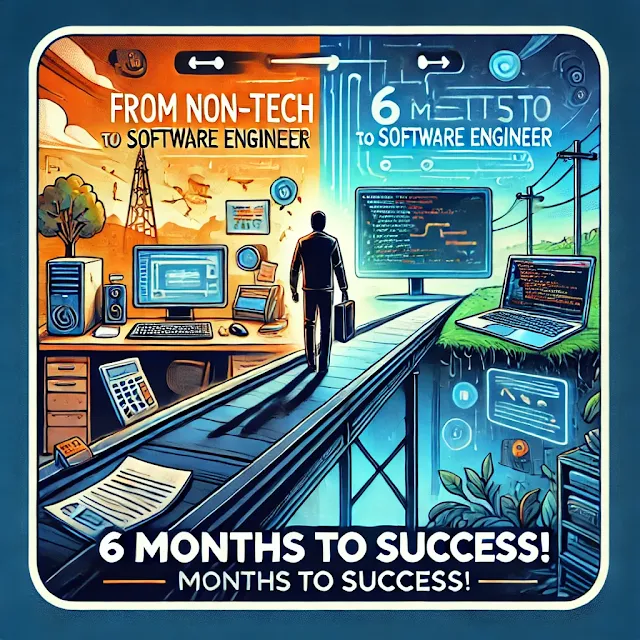Introduction
Six months ago, I was stuck in a career that drained my energy, offered little growth, and left me yearning for something more fulfilling. I was in a non-tech job, surrounded by excel sheets and endless meetings, feeling like my potential was slipping away. But something changed—dramatically. Today, I’m thriving as a software engineer, a career I once thought was out of my reach.
What made this transformation possible? Was it a degree? Endless coding tutorials? Actually, no. It was a weird hack that flipped the script for me, a method so simple yet profound that it opened doors I didn’t even know existed.
If you’re wondering how to make a similar leap, keep reading. My journey is proof that anyone can transition to tech, no matter their background.
Context and Background
Rewind to a year ago: I was working as an administrative coordinator. My days revolved around managing schedules, writing reports, and handling logistics. While it was stable, it lacked excitement and growth opportunities. The turning point came during a particularly mundane day when I realized that five years down the line, I didn’t want to be stuck in the same position, doing the same tasks.
I always admired tech professionals—the flexibility, the opportunities, the creativity they brought to their work. But the idea of entering such a competitive field seemed intimidating. After all, I didn’t have a computer science degree or any prior coding experience. It felt like I was too late to even try.
Still, something inside me refused to settle. I began researching career transitions and stumbled upon countless inspiring stories of people who’d successfully transitioned into tech. The spark of possibility was lit, but I had no clear roadmap.
The Turning Point
The "aha moment" came during a conversation with a friend who worked as a developer. I shared my doubts about breaking into tech, and they said something that stuck with me:
"You don’t need to know everything. Start small, stay consistent, and focus on building projects."
This advice felt doable. I didn’t need to master everything at once; I just needed to start. But what truly unlocked my potential was a specific strategy—what I now call the “Project Hack.” Instead of getting lost in endless tutorials, I focused on creating real-world projects from day one.
Here’s how it worked:
I chose a High-Impact LanguageI started with Python. It’s beginner-friendly, widely used, and has applications in web development, data analysis, and automation.
- Week 1: Learn Python basics (loops, functions, and variables).
- Week 2-4: Build a simple calculator, a to-do list app, and an expense tracker.
- Months 2-3: Transition to web development with Flask, creating interactive apps.
The weird hack? It was all about shifting focus from passive learning to active problem-solving. Every small project I built boosted my confidence and solidified my knowledge.
The Journey and Challenges
Phase 1: Learning the Basics
The first month was rough. I struggled with imposter syndrome, constantly questioning if I was cut out for tech. Concepts like loops and conditionals seemed alien at first. But I reminded myself: progress over perfection.
I dedicated 2-3 hours daily to coding, treating it like a part-time job. On weekends, I doubled down, spending up to six hours experimenting with new concepts.
Phase 2: Building a Portfolio
By the second month, I had a handful of small projects. This was crucial. Instead of listing vague skills on my resume, I could point to actual applications I’d built. My portfolio became my proof of work, showcasing my progress and commitment.
Phase 3: Facing Rejection
Applying for jobs was its own challenge. I faced rejection after rejection. Some companies didn’t even respond. It was disheartening, but each rejection became an opportunity to refine my resume, improve my skills, and practice interviews.
Networking played a huge role here. I started connecting with developers on LinkedIn, attending virtual tech meetups, and asking for feedback on my portfolio. This opened doors to referrals and mentorships.
Phase 4: Landing the First Job
After nearly four months, I secured an internship at a startup. The pay was modest, but the learning was immense. I worked on real projects, collaborated with teams, and gained insights into the industry. By the sixth month, I was offered a full-time position as a junior software engineer.
Outcome and Transformation
Looking back, the transformation feels surreal. A year ago, I didn’t even know how to write a line of code. Today, I’m solving real-world problems, contributing to impactful projects, and building a career I’m genuinely excited about.
The financial and personal growth has been life-changing. My salary tripled, and I now have the flexibility to work remotely. But beyond the numbers, the biggest reward has been the confidence I’ve gained.
What’s surprising? The skills I thought were irrelevant from my previous job—like communication, organization, and problem-solving—turned out to be invaluable in my tech role. Transitioning into tech doesn’t mean starting from scratch; it means building on the foundation you already have.
Conclusion and Takeaways
If you’re dreaming of a tech career but feel held back by doubts or lack of experience, let my story be proof that it’s possible.
Here’s my advice:
- Start small. Pick a single language or skill and master the basics.
- Build projects, not just knowledge. Your portfolio is your ticket into the industry.
- Seek out communities. The journey is easier with support and accountability.
- Embrace rejection. Every “no” is a step closer to “yes.”
The path to becoming a software engineer isn’t easy, but it’s achievable with the right mindset and consistent effort. So, take the leap, start today, and let your journey to tech success begin.
